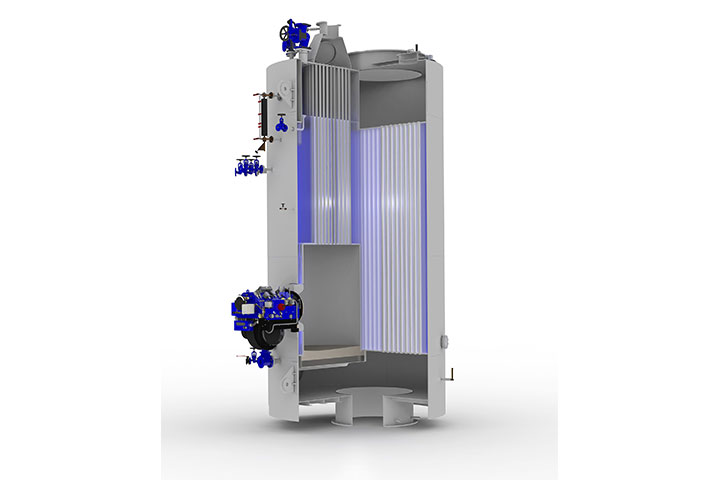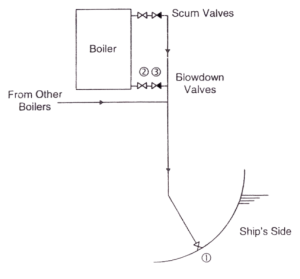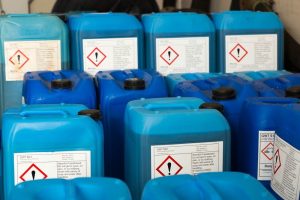Marine boilers are critical components of a ship’s propulsion and auxiliary systems, providing the necessary steam for power generation, heating, and other operational needs. However, the efficiency, safety, and longevity of these boilers depend heavily on the quality of the water used within them. Poor water quality can lead to scaling, corrosion, and foaming, which can compromise boiler performance, increase fuel consumption, and even result in catastrophic failures. Therefore, maintaining the quality of marine boiler water is essential, and this involves regular testing, proper blowdown procedures, and the correct addition of chemicals.
The Importance of Boiler Water Quality
Marine boilers, which vary in design and working pressure (e.g., low-pressure auxiliary boilers and high-pressure main boilers), require different water quality standards and treatment approaches. High-pressure boilers demand ultra-pure water with stringent chemical treatment to prevent scaling, corrosion, and foaming, as they are more susceptible to damage from impurities. Low-pressure boilers, while less sensitive, still require proper water treatment to maintain efficiency and safety. Tailored chemical dosing, regular testing, and blowdown procedures are essential to meet the specific needs of each boiler type, ensuring optimal performance, fuel efficiency, and compliance with safety standards. Failure to address these differences can lead to operational inefficiencies, increased maintenance costs, and potential boiler failures.
In general, the water quality of the Marine Boiler directly impacts the performance and longevity of the boiler system. The presence of impurities such as dissolved oxygen, carbon dioxide, and salts can lead to corrosion, scale formation, and carryover:
- Preventing Scale Formation: Impurities in water, such as calcium and magnesium salts, can form scale on the internal surfaces of the boiler. Scale acts as an insulator, reducing heat transfer efficiency and leading to overheating, which can cause tube failures.
- Avoiding Corrosion: Dissolved oxygen and other corrosive gases in water can lead to the corrosion of boiler metal surfaces. Corrosion weakens the boiler structure and can result in leaks or ruptures.
- Preventing Foaming and Carryover: High levels of dissolved solids can cause foaming, leading to carryover of water into the steam system. This can damage downstream equipment, such as turbines and heat exchangers, and reduce the overall efficiency of the system.
- Ensuring Operational Efficiency: Clean, well-maintained boiler water ensures optimal heat transfer, reduces fuel consumption, and extends the lifespan of the boiler.
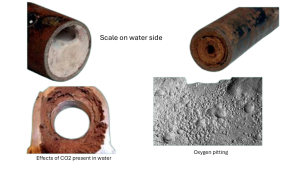
Boiler Water Tests Conducted on Board
Boiler water tests conducted on board are critical for ensuring the safe and efficient operation of marine boilers. These tests monitor key parameters such as alkalinity, chloride levels, dissolved oxygen, and phosphate concentrations to prevent scaling, corrosion, and foaming, which can lead to boiler failure or reduced efficiency. The results of these tests are directly linked to the Ship Management System (SMS), as they form part of the vessel’s preventive maintenance and safety protocols. Regular testing and documentation are essential for compliance with international regulations and classification society requirements. Failure to conduct these tests or address deviations promptly can lead to non-conformities during audits, posing risks to operational safety and potentially resulting in penalties or detention of the vessel. Proper adherence to boiler water testing procedures underscores the importance of the SMS in maintaining operational integrity and safety standards.
To maintain the quality of boiler water, regular testing is essential. Marine engineers typically perform the following tests:
- Total Dissolved Solids (TDS): High TDS levels can lead to scaling and foaming. Regular testing helps determine when blowdown is necessary to reduce TDS concentrations.
- Alkalinity: Proper alkalinity levels help prevent corrosion and maintain the pH balance of the water. Low alkalinity can lead to acidic conditions, while high alkalinity can cause caustic embrittlement.
- pH Levels: The pH of boiler water should be maintained within a specific range (usually between 10.5 and 11.5) to minimize corrosion and scaling.
- Chloride Levels: High chloride concentrations can indicate seawater contamination, which is highly corrosive and must be addressed immediately.
- Dissolved Oxygen: Oxygen is a primary cause of corrosion in boilers. Regular testing ensures that oxygen scavengers are effectively removing dissolved oxygen from the water.
- Phosphate and Sulfite Levels: These chemicals are added to control scaling and corrosion. Regular testing ensures that their concentrations are within the recommended range.
- Feed Water Hardness: High hardness can cause scaling, necessitating the addition of phosphates.
These tests help engineers make informed decisions about blowdown frequency and chemical dosing.
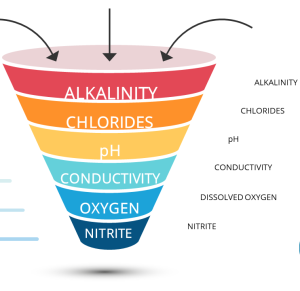
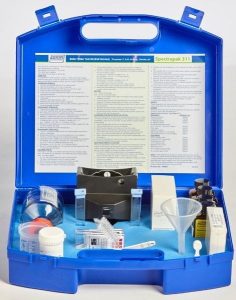
Correct Blowdown Procedures
Blowdown is a crucial maintenance procedure that helps remove accumulated impurities from the boiler water. This process involves draining a portion of water from the boiler to reduce Total Dissolved Solids (TDS) and prevent scale buildup. Proper blowdown procedures include:
- Bottom Blowdown: This involves removing sludge and sediments that accumulate at the bottom of the boiler. It is typically performed at regular intervals, depending on the boiler’s operating conditions.
- Surface Blowdown: This process removes dissolved solids that accumulate near the water surface. Surface blowdown is usually continuous and is adjusted based on TDS levels.
- Frequency and Duration: The frequency and duration of blowdown depend on the boiler’s operating pressure, feedwater quality, and the results of water tests. Over-blowing can waste water and energy, while under-blowing can lead to scaling and corrosion.
- Recording: Documenting blowdown activities in the Oil Record Book (ORB) and engine room logbook for compliance and safety audits.
Steps for Correct Blowdown:
- Check boiler water parameters before initiating blowdown.
- Open the blowdown valve slowly to prevent sudden pressure drops and thermal shocks.
- Maintain steady flow for a few minutes, ensuring effective impurity removal.
- Close the valve carefully and check water levels, refilling if necessary.
- Re-test water parameters to ensure balance is maintained.
If steps in the “Correct Blowdown Procedures” section are done incorrectly, it can lead to serious consequences. Improper blowdown can cause thermal shock, damaging boiler components, or result in inadequate removal of impurities, leading to scaling, corrosion, and reduced boiler efficiency. Over-blowing wastes water and energy, while under-blowing risks boiler failure. Incorrect documentation can lead to non-conformities during audits, violating safety and environmental regulations. Proper execution is essential to maintain boiler performance, ensure safety, and comply with SMS requirements.
Proper Addition of Boiler Water Chemicals
Chemical treatment is essential for maintaining boiler water quality and preventing corrosion and scale formation. The correct application of chemicals depends on water test results and manufacturer recommendations.
- Oxygen Scavengers (e.g., Sodium Sulfite or Hydrazine): Used to remove dissolved oxygen and prevent pitting corrosion.
- Alkalinity Builders (e.g., Sodium Hydroxide or Sodium Carbonate): Maintain appropriate pH levels to reduce acidic corrosion.
- Phosphates and Polymers: Prevent scale formation by binding with hardness ions and keeping them in solution.
- Sludge Conditioners: Prevent the accumulation of sludge by dispersing solid particles.
- Anti-Foaming Agents: Reduce foaming and prevent carryover of water into steam lines.
In the maritime industry, key players in the boiler water chemical market include Veolia Water Technologies, Nalco Water (Ecolab), GE Water & Process Technologies, Kurita Water Industries, Solenis, Unitor (part of Wilhelmsen Ships Service), Nalfleet (part of Nalco Water, now under Ecolab), and The Gulf. These companies provide specialized chemical solutions tailored for marine boilers. The most commonly sold chemicals for marine boilers include oxygen scavengers (e.g., sodium sulfite, hydrazine, Nalfleet 2000 series), alkalinity builders (e.g., sodium hydroxide, sodium carbonate), phosphates (e.g., trisodium phosphate), polymers for scale inhibition, sludge conditioners, and anti-foaming agents. Unitor and Nalfleet, in particular, are well-known for their reliable and effective boiler water treatment products, such as oxygen scavengers and scale inhibitors, while others offers cost-effective solutions like pH adjusters and oxygen scavengers. Proper selection and dosing of these chemicals, based on water test results and manufacturer guidelines, are critical to prevent corrosion, scaling, and foaming, ensuring efficient boiler operation and compliance with safety and environmental standards.
Steps for Correct Chemical Dosing:
- Conduct boiler water tests to determine the required chemical adjustments.
- Calculate the appropriate dosage based on water volume and treatment recommendations.
- Add chemicals gradually to the feedwater system to ensure even distribution.
- Monitor the effectiveness of treatment through regular water analysis.
- Adjust dosages as needed based on test results and operational conditions.
Maintaining the quality of marine boiler water is a critical aspect of ship operations. Regular testing, proper blowdown procedures, and the correct addition of chemicals are essential practices that ensure the efficient and safe operation of marine boilers. By adhering to these practices, marine engineers can prevent scaling, corrosion, and foaming, thereby extending the lifespan of the boiler, reducing fuel consumption, and avoiding costly repairs or failures. In the demanding environment of marine operations, vigilance in boiler water management is not just a best practice—it is a necessity.
Marine Boiler Water Quality – Quiz
This quiz aims to assess understanding of the critical aspects of maintaining marine boiler water quality, including its importance, testing procedures, blowdown methods, and chemical treatments necessary for safe and efficient ship operations.
Multiple Choice Questions
- What is the primary purpose of marine boilers on ships?
- A) To generate electricity
- B) To provide steam for propulsion and auxiliary systems
- C) To cool the engine
- D) To store fuel
- Which of the following impurities can lead to scale formation in marine boilers?
- A) Sodium
- B) Calcium and magnesium salts
- C) Sulfur dioxide
- D) Carbon monoxide
- What is the recommended pH range for maintaining boiler water quality?
- A) 6.0 to 7.0
- B) 7.5 to 8.5
- C) 10.5 to 11.5
- D) 12.0 to 13.0
- Which chemical is commonly used as an oxygen scavenger in boiler water treatment?
- A) Sodium Chloride
- B) Sodium Sulfite
- C) Calcium Carbonate
- D) Sodium Hydroxide
Fill-in-the-Blank Questions
- The process of removing accumulated impurities from boiler water is known as __________.
- High levels of __________ in boiler water can cause foaming and carryover into the steam system.
- Regular testing of boiler water helps engineers make informed decisions about blowdown frequency and __________.
True or False Questions
- True or False: Scale formation does not affect the heat transfer efficiency of a marine boiler.
- True or False: Surface blowdown is typically performed at regular intervals to remove sludge and sediments from the bottom of the boiler.
- True or False: Monitoring the effectiveness of chemical treatment in boiler water is unnecessary once chemicals are added.
Quiz: Maritime English & Marine Boiler Water Quality
Maritime English Grammar & Usage
-
Choose the correct passive voice sentence:
The engineers treat the boiler water regularly to prevent scaling.
a) The boiler water is treating regularly to prevent scaling.
b) The boiler water is treated regularly to prevent scaling.
c) The boiler water was treated regularly to prevent scaling.
d) The boiler water has treated regularly to prevent scaling. -
Choose the correct past simple sentence:
Yesterday, the chief engineer (perform) a test on the boiler water.
a) The chief engineer performed a test on the boiler water.
b) The chief engineer has performed a test on the boiler water.
c) The chief engineer is performing a test on the boiler water.
d) The chief engineer performs a test on the boiler water. -
Which sentence is in the present perfect tense?
a) The boiler water has been tested for impurities.
b) The boiler water was tested for impurities.
c) The boiler water is testing for impurities.
d) The boiler water will be tested for impurities. -
Choose the correct passive form using a modal verb:
The crew must check the boiler water levels daily.
a) The boiler water levels must be checked daily.
b) The boiler water levels must checked daily.
c) The boiler water levels must checking daily.
d) The boiler water levels must been checked daily. -
Which of the following is in the correct future tense (passive voice)?
a) The boiler water will be tested by the crew tomorrow.
b) The boiler water was tested by the crew tomorrow.
c) The boiler water is tested by the crew tomorrow.
d) The boiler water has been tested by the crew tomorrow. -
Fill in the blank with the correct word:
If the boiler water ___ treated properly, corrosion will occur.
a) isn’t
b) wasn’t
c) hasn’t
d) weren’t -
Choose the correct passive voice question form:
a) Has the boiler water been tested today?
b) Was the boiler water testing today?
c) Did the boiler water been tested today?
d) Does the boiler water tested today? -
Identify the correct present continuous sentence:
a) The crew is monitoring the boiler water temperature.
b) The crew are monitoring the boiler water temperature.
c) The crew was monitoring the boiler water temperature.
d) The crew has monitoring the boiler water temperature. -
Which sentence correctly uses a conditional clause?
a) If the boiler water had been checked earlier, the damage could have been avoided.
b) If the boiler water has been checked earlier, the damage could have been avoided.
c) If the boiler water was checked earlier, the damage could avoided.
d) If the boiler water would be checked earlier, the damage was avoided. -
Choose the correct question form using present perfect:
a) Have they checked the boiler water pressure?
b) Did they checked the boiler water pressure?
c) Have they checks the boiler water pressure?
d) Has they checked the boiler water pressure?
b) , a), a), a), a), a), a), a), a), a),

